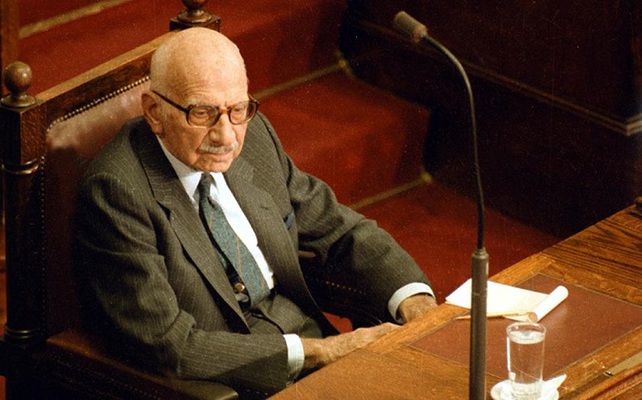Speaking English Using Greek: Flashback to Zolotas’ Historic Speech

As we study our common linguistic roots, It would be nice to recall the speeches in English — peppered with Greek-origin words and phrases — given by economist and politician Xenophon Zolotas in the late 1950s.
Zolotas was director of the Bank of Greece when he appeared in front of an audience at an International Bank for Reconstruction and Development conference in 1959.
He delivered two speeches in English using Greek words to emphasize the wealth of the Greek language and the fact that countless Greek words enrich English.
Here is the second speech delivered Oct. 2, 1959:
Kyrie,
It is Zeus’ anathema on our epoch and the heresy of our economic method and policies that we should agonize the Skylla of nomismatic plethora and the Charybdis of economic anaemia.
It is not my idiosyncracy to be ironic or sarcastic but my diagnosis would be that politicians are rather cryptoplethorists. Although they emphatically stigmatize nomismatic plethora, they energize it through their tactics and practices. Our policies should be based more on economic and less on political criteria. Our gnomon has to be a metron between economic strategic and philanthropic scopes.
In an epoch characterized by monopolies, oligopolies, monopolistic antagonism and polymorphous inelasticities, our policies have to be more orthological, but this should not be metamorphosed into plethorophobia, which is endemic among academic economists.
Nomismatic symmetry should not antagonize economic acme. A greater harmonization between the practices of the economic and nomismatic archons is basic.
Parallel to this we have to synchronize and harmonize more and more our economic and nomismatic policies panethnically. These scopes are more practicable now, when the prognostics of the political end economic barometer are halcyonic.
The history of our didimus organization on this sphere has been didactic and their gnostic practices will always be a tonic to the polyonymous and idiomorphous ethnical economies. The genesis of the programmed organization will dynamize these policies.
Therefore, I sympathize, although not without criticism one or two themes with the apostles and the hierarchy of our organs in their zeal to program orthodox economic and nomismatic policies.
I apologize for having tyranized you with my Hellenic phraseology. In my epilogue I emphasize my eulogy to the philoxenous aytochtons of this cosmopolitan metropolis and my encomium to you Kyrie, the stenographers.
Here's an interesting presentation:
Now it's your turn!
TASK
1. Choose as many words as you can from the tables below and from the page with the lists of common words:
http://twinspace.etwinning.net/72037/pages/page/442378
2, Then write a message to the European politicians using as many words with greek origin as you can.
Your message should be about 100 - 120 words long.
Watch this video for more information:
| Ελληνικά | English | Français | Italiano | Español | Deutsch | Română |
| πολιτική | politics | politique | politica | política | Politik | politică |
| δημοκρατία | democracy | démocratie | democrazia | democracía | Demokratie | democraţie |
| στρατηγική | strategy | stratégie | strategia | estrategia | Strategie | strategie |
| σύστημα | system | système | sistema | sistema | System | sistem |
| ιδεολογία | ideology | idéologie | ideologia | ideología | Ideologie | ideologie |
| τυραννία | tyranny | tyrannie | tirannia | tiranía | Tyrannei,Tyrannis | tiranie |
| διάλογος | dialoque | dialogue | dialogo | diálogo | Dialog | dialoque |
| αναρχία | anarchy | anarchie | anarchia | anarquía | Anarchie | anarhie |
| οικονομία | economy | économie | economia | economía | Ökonomie | economie |
| κόστος | cost | coût | costo | costo/coste | Kosten | cost |
| ευρώ | euro | euro | Euro | Euro | Euro | euro |
| Ευρώπη | Europe | Europe | Europa | Europa | Europa | Europa |
| ανάλυση | analysis | analyse | analisi | análisis | Analyse | analiză |
The main aim of this activity is to imitate the way Xenophon Zolotas wrote his speeches using only Greek words that have passed into English or as many such words as you can. For this purpose you are given the list of words used by Xenophon Zolotas enriched with additional words to have more options. The words are placed in the following table in alphabetical order:

Post your messages on this padlet:
Participating students in this activity
| | NAME | COUNTRY | SCHOOL |
| 1. | Antonis Zorpidis | Greece | 27th General Lyceum of Athens |
| 2. | Dora Athanasiadi | Greece | 27th General Lyceum of Athens |
| 3. | Dimitris Adamopoulos | Greece | 27th General Lyceum of Athens |
| 4. | Alexandros Petrake | Greece | 27th General Lyceum of Athens |
| 5. | Matteo Vitale | Italy | Liceo scientifico statale " G. Berto" Vibo Valentia |
| 6. | Amanda García | Basque-Spain | IES Unamuno BHI |
| 7. | Irati Elias | Basque-Spain | IES Unamuno BHI |
| 8. | Izaro De Pedro | Basque-Spain | IES Unamuno BHI |
| 9. | Ekaitz Manzano | Basque-Spain | IES Unamuno BHI |
| 10. | Cristina Radu | Basque-Spain | IES Unamuno BHI |
| 11. | Leire Pallares | Basque-Spain | IES Unamuno BHI |
| 12. | Irene Rodriguez | Basque-Spain | IES Unamuno BHI |
| 13. | Rita Lopez | Basque-Spain | IES Unamuno BHI |
| 14. | Iliana Katsifou | Greece | Panou school Nafpaktos |
| 15. | Stella Doupoli | Greece | Panou school Nafpaktos |
| 16. | Argiro Tampaki | Greece | Panou school Nafpaktos |
| 17. | Steliana Panagiotounakou | Greece | Panou school Nafpaktos |
| 18. | Zoi Lymperi | Greece | Panou school Nafpaktos |
| 19. | Anna Chalantzouka | Greece | Panou school Nafpaktos |
| 20. | Athina Matthaiou | Greece | Panou school Nafpaktos |
| 21. | Peny Karampela | Greece | Panou school Nafpaktos |
| 22. | Agelina Tomara | Greece | Panou school Nafpaktos |
| 23. | Ilian Kassari | Greece | Panou school Nafpaktos |
| 24. | Mitsou Konstantina | Greece | Panou school Nafpaktos |
| 25. | Andrew Androutselis | Greece | Panou school Nafpaktos |
| 26. | Hannah Becker | Germany | Freiherr-vom-Stein-Schule |